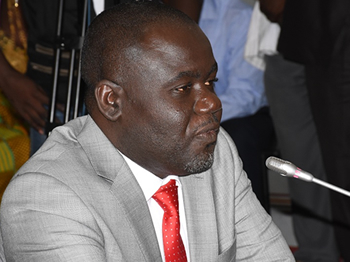Local content policy will manifest in the maritime industry – Minister
 Mr Kwaku Ofori Asiamah, the Minister of Transport, has said the Ministry was putting structures, policies and legislations in place to ensure local content policy was made to manifest in the maritime industry.
Mr Kwaku Ofori Asiamah, the Minister of Transport, has said the Ministry was putting structures, policies and legislations in place to ensure local content policy was made to manifest in the maritime industry.
He said work that should be reserved to the indigenes in accordance with international practices and existing legislation would be enforced.
Mr Asiamah was speaking at the inauguration of the Ghana Chamber of Shipping (GCS), a new trade association in the country, which seeks to champion the interest of the shipping industry in Accra.
The Chamber seeks to provide advice on policies and strategies for the sound development of the maritime industry in Ghana and also liaises with governmental bodies, whose work impinge on the maritime industry in order to achieve harmony in the sector.
He said it was within the framework of globalisation and in accordance with best practices that the Ministry was putting these structures together.
“All these will require high quality research and advice that will inform policy and shape the decision of the Ministry and in this quest, the expertise of the Chamber will come in handy,” he added.
He said the dynamic nature of the maritime industry called for a constant review of existing policies and the refashioning of same to keep pace with the ever-changing trends and developments.
Mr Asiamah said in recent times, the country’s ports environment had become a safe place for many vessels to dock and wait for their turn before calling at their ports, adding that the safe haven provided to these ships should not be taken for granted.
He entreated the executives of the Chamber to build the capacity of its members within their fold to enable them not only criticise but come out with pragmatic solutions to the challenges that confront the maritime transport industry.
The Minister said the Ministry remained committed to working with the Chamber in its quest to find lasting solutions to the problems confronting the industry and to put in place a comprehensive maritime transport policy underpinned by a robust governance structure that addresses not only growth but also sustainability and care for the environment.
He said the Ministry would not only expect the chamber to provide comments on government policies but also bring up policy initiatives that would propel the maritime sector and indeed the economy to growth and prosperity.
He said one of the objectives of government to ensure efficient development of the transport sector was to continue to secure and safeguard the country’s transport infrastructure and facilities from various hazards.
Dr Kofi Mbiah, the Chief Executive Officer of GCS, said the Chamber had been formed at a time when there were devastating changes occurring in the international maritime arena.
He said the Chamber was expected to conduct research into issues that posed threat to the sector and other pertinent areas of the industry, contribute its quota of knowledge and expertise to help shape the maritime policy of the country for growth.
He said a comprehensive maritime policy would take account of the wide range of maritime policy issues ranging from labour, fishery, through oil and gas and tourism, the protection of the marine environment and the formation of maritime clusters.
“To enable this not for profit association to contribute its quota to the Ghana beyond aid agenda, it will require the support of all especially the business community,” Dr Mbiah said.
Mr Ben Owusu Mensah, the Chairman of GCS, paid tribute to Dr Asoma Banda, the Life Patron of the Chamber for being the doyen of Ghana shipping for his contribution to industry.
He said since its formation, the Chamber had been able to mediate in fashioning out two major policies in the maritime industry namely Shipping Service Providers Regulation 2017 and the Domestic Shipping (Cabotage) Bill, 2017.
Source: GNA
